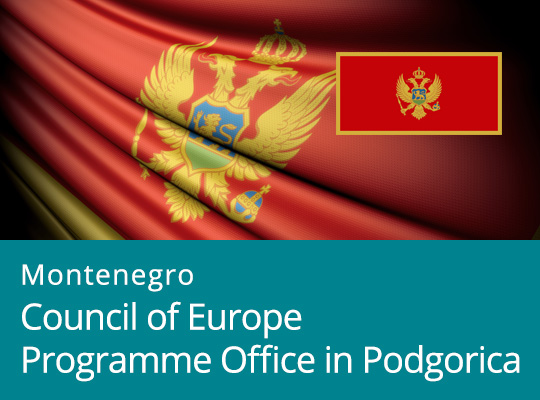Support to the Ombudsperson Office and the Constitutional Court of Montenegro in applying European Human Rights standards (SOCCER)
Action summary
Within the overall framework of pursuing anti-discrimination policies, the Action is expected to: enhance the professional capacities of key personnel of State authorities, Judiciary, Law enforcement authorities, Ombudsman and other institutions engaged under this project, strengthening their internal organisational efficiency and resources and improve their public communication practice.
In concrete terms, this action will contribute to the enhanced efficiency of the Ministry for Human and Minority Rights to protect the human rights of marginalised groups (LGBT, Roma, minorities and people with disabilities) as well as improved capacity of the Ombudsperson’s Office to process anti-discrimination cases and carry out NPM functions. Furthermore, this action would raise capacities of the Ministry of Justice to further align the prison system of Montenegro with international human rights standards. Finally – through the development of a training curriculum with HELP methodology, this action will develop capacities of the Judicial Training Centre to serve as the long term educational platform for judicial representatives in the areas of human rights and anti-discrimination. This will complement the previous activities, which are targeting preventive aspect of human rights protection and contribute to the improved human rights awareness among the judicial branch.
Overall objective
The Project’s overall objective was to contribute to improve the protection of human rights in Montenegro, through improving the capacity of the Ombudsperson’s Office to apply European human rights standards in its daily work and enhancing the capacity of the Constitutional Court to apply European human rights standards in its daily work.
Expected outcomes
Outcome 1: The capacity of the Ombudsperson’s Office to deal with anti-discrimination cases is strengthened
Outcome 2: The capacity of the Ombudsperson’s Office to carry out its responsibilities as NPM under OPCAT is improved
Outcome 3: The institutional capacity of the Constitutional Court to deal with individual applications is strengthened
Outcome 4: The capacity of the judges of the Constitutional Court to use ECHR-based arguments is enhanced
Main activities
- Targeted needs assessment missions to identify the needs and proposition of recommendations to improve the situation
- Development of practical guidelines for the staff of the Ombudsperson’s Office and the Constitutional Court
- Training seminars and workshops on European human rights standards to improve the knowledge and skills of the staff of the Ombudsperson’s Office and the Constitutional Court
- On-site training visits to improve the practical skills of the Ombudsperson’s Office
- ICT Case management system for Constitutional Court
- Regional conference and study visits to the CoE and other member states to better understand the functioning of the ECtHR and exchange best practices
- Expert support to the Ombudsperson’s office and the Constitutional Court to implement the recommendations of CoE and its monitoring bodies
Methodology
The Project implementation was based on the findings of violations identified in the judgments of the ECtHR against Montenegro, the reports of the CoE bodies (ECRI recommendations, CPT reports, etc.) and other international organisations and structural problems identified in the relevant decisions and/or interim resolutions of the CoE Committee of Ministers. The priorities identified by the Montenegrin authorities in their reform strategies and EU accession negotiation action plans were carefully considered. This said, implementation methodology entailed:
- concrete tailor-made training exercises to ensure capacity building for staff of partner institutions and the basis of most relevant ECtHR case law and findings of relevant CoE monitoring bodies,
- study visits to CoE/ECtHR and counterpart institutions from CoE countries to ensure transfer of experiences and good practices, and
- engagement of in situ expertise for the partner institutions, for the purpose of mentoring their staff in practical implementation of human rights standards in practice.
Achieved results – success stories:
Under the project framework, the capacities of the staff of the Ombudsperson’s Office to process anti-discrimination cases has been significantly enhanced, with increased knowledge of European human rights standards and ECtHR case-law as well as developed concrete guidelines for resolving the complaints on discrimination from various grounds. Namely, in 2015 Ombudsperson’s Office received 679 complaints, which amounted for 10% increase in comparison to 2014, and out of all cases – Ombudsperson’s Office resolved 666 cases (98.1%), thus achieving maximum efficiency in its history. In addition, references to the ECtHR case-law became standardised professional routine in their everyday work.
The NPM department has been significantly strengthened in terms of capacity development of the NPM staff. The Ombudsperson’s office benefited from design of operational guidelines/checklists tailored made for each staff members for each of the place of depravation of liberty, which was later supplemented with first of its kind mentoring support for the NPM staff in conducting monitoring visits. Alongside specific study visits, which allowed NPM staff to join to NPM counterparts from Denmark, Slovenia and France, project facilitated targeted discussions and regular monitoring visits in their own respective countries (Slovenia), contributed to the final formulation of specific working model/approach of Montenegrin NPM, which they lacked previously.
The capacity of the Constitutional Court judges and advisors to deal with individual applications has been strengthened through targeted trainings on specific ECHR articles with ECtHR judges and lawyers, exchange of experiences with constitutional courts from CoE countries and introduction of modern electronic case management and filtering system.
SOCCER project strongly contributed to the enhanced capacities of the Constitutional court of Montenegro and advocated for the observance of CoE standards – which all eventually led to the decision of the ECtHR to proclaim the constitutional complaint in Montenegro as an effective legal remedy in November 2015.



